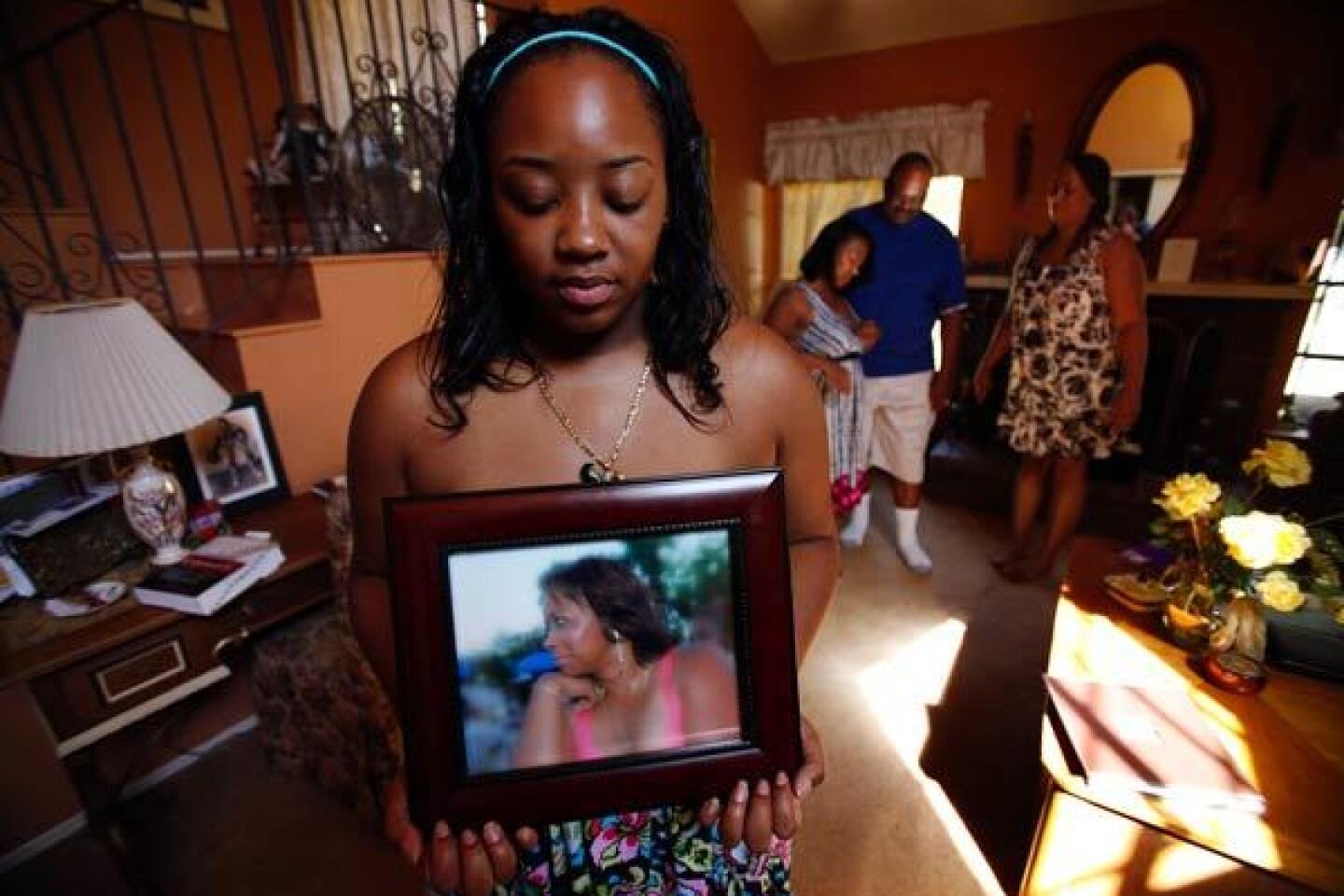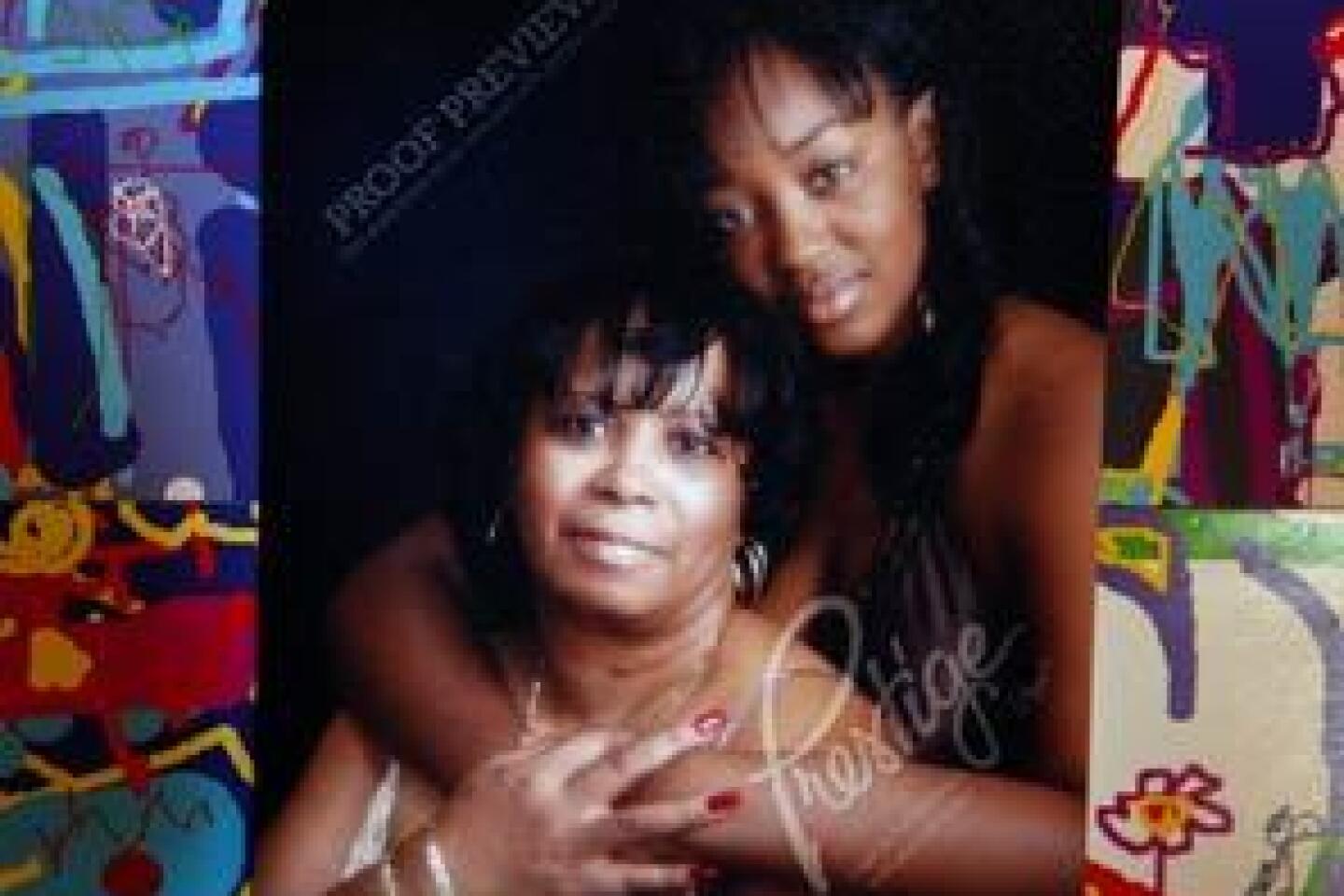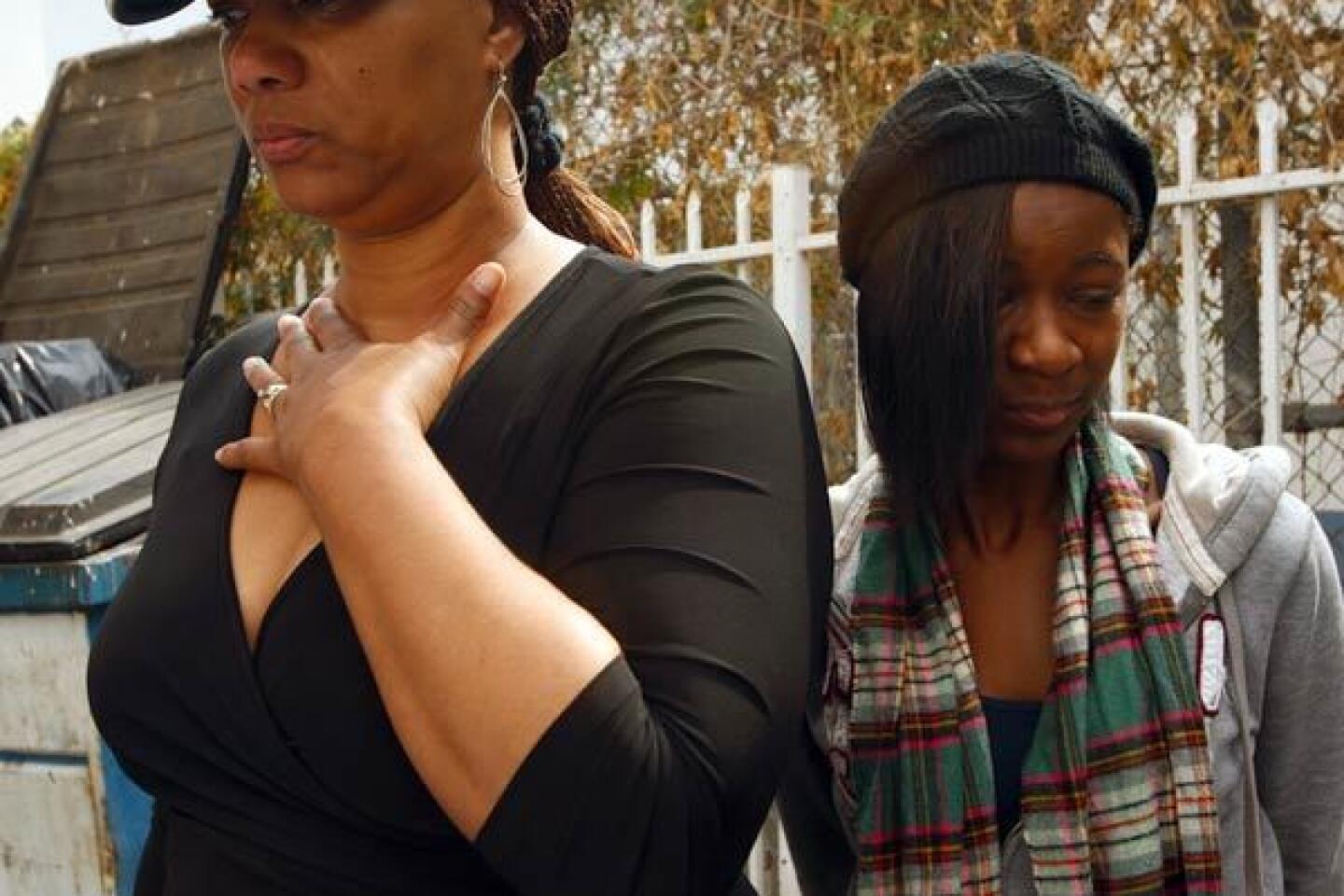Family had feared violence but hadn’t foreseen victim
- Share via
Second of two parts
Michael Slider was home on a day off from his job as a Los Angeles police detective when his phone rang shortly after 10 in the morning. It was his teenage niece.
“They shot Grandma. Someone shot Grandma,” she said over and over.
Slider’s mind raced. The girl had spent the night before with her grandmother, Pamela Lark, and Lark’s daughter, Khristina Henry. For months, mother and daughter had been living in fear. Slider’s stomach tightened with panic as he grabbed his keys.
He sped down the freeway toward his sister-in-law’s Mid-City apartment, listening on his LAPD radio to police arriving at the scene. One asked for a supervisor, another for dispatchers to send 10 more patrol units. A third ordered someone to string up yellow crime tape. “Jesus,” he thought to himself, “this is bad.”
By the time he arrived, Lark had been rushed to Cedars-Sinai Medical Center, where doctors pronounced her dead.
“I know who did this,” Slider told a lieutenant who tried to console him at the crime scene. “His name is Tyquan Knox.”
Four months earlier, in September 2006, Khristina had been robbed at gunpoint in a parking lot outside a bowling alley and had identified Knox as the gunman to police. Knox had been a highly touted but troubled football phenom from Crenshaw High School who had dreams of making it in the NFL.
After the robbery, Knox’s mother and others had contacted Khristina and Lark several times, proclaiming his innocence and trying to dissuade the teenager from testifying.
Slider had urged Lark and Khristina to ask LAPD detectives for help moving to the safety of another part of the city. The detectives told Lark that money was available to help her relocate, but she had to find a new apartment before getting the funds.
Lark had tried but failed to find a place. Now, she was dead, four days before Khristina was to testify against Knox.
Police officers canvassed the neighborhood and found two women who had noticed a young black woman sitting behind the wheel of a Chevy Impala about a block from Lark’s apartment. The new car, which still had temporary dealership license plates, had caught the women’s attention because it was double-parked on the wrong side of the street. Minutes after the shooting, they saw a man dressed in black jog up the street and climb into the car.
From the witnesses’ description, detectives traced the car to a Hawthorne dealership. A check of sales records turned up a handful of people who had recently bought Impalas. One was Knox.
Police put the house Knox shared with his mother and stepfather in South L.A. under surveillance. Late that afternoon, Knox arrived with a friend and went inside. He was arrested as he tried to leave.
A few miles away, about the same time, police arrested 18-year-old Keeairra Dashiell, Knox’s girlfriend. Officers took her into custody as she tried to drive away from her family’s home in an Impala with temporary dealer plates.
Sitting in a cramped interrogation room in the Wilshire Division police station, Dashiell gave homicide detectives a convoluted account of the morning: She had awoken early for a doctor’s appointment. Tyquan had lent her the Impala and, as she left the house, an acquaintance who she knew only as Justin or by his gang moniker, Rampage, approached.
He asked for a ride and she agreed, dropping him off somewhere on Washington Boulevard. Dashiell told police she waited for Justin, never having asked what he was doing. It was still early, Dashiell said, and she fell asleep in the car. She awoke when Justin returned hours later.
The homicide detectives sitting across the table from Dashiell were having none of it. They believed that Knox was the shooter and that Dashiell was covering for him. But Dashiell wouldn’t budge.
At one point, after Knox had been escorted into a nearby room, she yelled through the wall that she loved him and had said nothing to the police. “They trying to say that you set it up. But I don’t know what they’re talking about, so don’t let them lie,” she is heard saying on an LAPD video reviewed by The Times.
“Girl, chill out,” Knox replied.
Near dawn, more than 12 hours after her arrest, Dashiell’s parents met with police. A detective laid out the situation: A woman was dead and their daughter’s boyfriend was the prime suspect. Dashiell, the detective told them, had essentially placed herself behind the wheel of the getaway car, but she was refusing to give up Knox.
“She won’t be the first woman that’s serving life in prison as a getaway driver,” one detective said. “What I’m hoping you guys will do is talk some sense into her.
“She’s probably a very smart girl,” he added. “But when love gets in the way. . . .”
Designated a gifted student by school officials, Dashiell graduated near the top of her class at Crenshaw with almost perfect grades and had earned a scholarship to UC San Diego. Her parents saw Knox as a thug who would someday get their daughter in trouble and had been on Dashiell to end the relationship. She had rebelled and briefly moved in with Knox and his family.
Wearing a UC San Diego sweat shirt, Dashiell looked meekly at her parents as they were escorted into the interview room.
“I didn’t do nothing,” she said.
Her mother, an MTA bus driver, covered her face with her hands and began to cry.
Her father, a railroad company worker, did the talking.
“I told you to stay away from Tyquan, but you didn’t want to listen. Now look at your situation,” he said. “We’re looking at writing to you [in prison] for the rest of your life or until they stick a needle in your arm and kill you -- ‘cause these people are talking about giving you the death penalty.”
Her mother’s crying turned to sobs.
“You need to tell these people the truth,” her father urged. “These police are not playing.”
Dashiell spoke softly for a few seconds, her words not audible on the police videotape.
“You ready?” her father asked a few minutes later.
Dashiell nodded, falling into a tearful embrace with her mother.
“We gonna get you out of this as much as we can, you hear me?” her father said before leaving the room.
Dashiell told police that Knox had, in fact, been with her in the car. Knox had picked her up and, when he told her to, she had climbed behind the wheel and waited.
Dashiell told them more -- how she believed Knox was in line for a football scholarship and was worried that the robbery charge might derail his plans. She told them how Knox, days before the shooting, had sent her to the coffee shop in Culver City where Khristina worked to get him a description to refresh his memory.
Danette Meyers, the prosecutor in the case, speculates that Knox grew impatient waiting for Khristina to return from school and, when her mother appeared, decided “to send a message one way or the other.”
In June, after 2 1/2 years in jail, Dashiell accepted a long-discussed plea deal from Meyers. She pleaded guilty to voluntary manslaughter in exchange for a seven-year sentence and her testimony against Knox at his trial, which could begin as early as today. She will be the key to the prosecution’s case, especially given that police never recovered the gun used to kill Lark and have no forensic evidence tying Knox to the murder. Although both are frightened, Khristina and her now-former boyfriend are planning to testify.
As part of her plea agreement, Dashiell gave prosecutors a fuller version of events. In testimony before the judge at a hearing, she said for the first time that she had seen Knox with a gun the morning of the murder and knew what he was planning to do.
John Sweeney, Knox’s attorney, said Knox is innocent of both the robbery and the murder. He acknowledged that Knox was in the bowling alley parking lot the night of the robbery but said he was wrongly identified as the gunman. As for the murder, Sweeney said it would be a mistake to believe Dashiell -- despite her good grades and college scholarship.
He pointed to police records that show a semi-automatic weapon was found in a bedroom in Dashiell’s home the day she was arrested. Police attributed the gun -- a different style and caliber than the weapon used to kill Lark -- to Dashiell, but her lawyer said it was found in a sister’s room. Sweeney also said that after her arrest, Dashiell was charged with assaulting a female guard in jail. “She is not the angel she appears to be,” Sweeney said.
Dashiell, Sweeney claimed, was obsessed with Knox and the idea of someday being married to a professional football player. She bought him gifts and tolerated his flings with other girls, according to Knox’s parents. She tattooed his name on her wrist, they said.
“She was so madly in love with Tyquan that she would -- and did -- go to the lengths of setting up this killing,” Sweeney said. He maintained that the Justin figure is real and was enlisted by Dashiell. She changed her story, he suggested, only after being pressured by her parents and offered an incentive by prosecutors.
“They gave her a sweetheart deal that would entice her to say anything,” Sweeney said.
Slider, meanwhile, watched as his family threatened to pull apart at the seams in the wake of the murder. Lark’s eldest daughter, a state prison guard, sank into a deep depression and battled insomnia. She was told she could no longer work as a guard and was forced to take a low-paying administrative assignment.
Lark’s grandchildren, who witnessed the killing, have also struggled. Her young grandson stopped talking, regressed on potty-training and developed a fixation with guns. Her teenage granddaughter went from being bookish and obedient to running with a rough crowd and stealing from family members.
Khristina has managed better than others. She gave up for a time on the nursing classes she was taking when her mother was gunned down but recently has enrolled again and holds down a full-time job as well. She lives in her own apartment outside of Los Angeles.
Slider said, “What hit me hardest was what was happening to my family. I could not just sit back. Something had to be done.”
Convinced that the detectives who investigated the holdup could have done more to protect Lark and Khristina, Slider did things he acknowledges he should not have done. He went into the LAPD’s computer system and printed out a copy of the detectives’ case file, telling himself at first that it was “just to have a record of what happened.”
Eventually, however, the bitterness gnawing at him became too much. He could no longer stand the fact that the detectives had withheld witness assistance funds from Lark until she could prove she would use the money appropriately, but then turned around and quickly provided cash for Khristina after Lark was killed. He was furious at what he believed was the department’s deliberate failure to investigate the detectives’ handling of the case.
Slider gave the detectives’ file to an attorney the family had hired for a lawsuit against the LAPD, hoping it might help to make a negligence case against the detectives. Police officials quickly learned that Slider had leaked the internal document and opened an investigation.
They found him guilty of misconduct and made him an offer: If he dropped the lawsuit and acknowledged that he had breached department policies, they would impose a relatively light penalty, a five-day suspension. Slider refused. “I can’t bring Pam back,” he said in an interview. “But I am not just going to sit here and let this stuff go on.”
So now, LAPD officials want Slider fired. In the department’s eyes, he can no longer be trusted. In Slider’s eyes, it is the department that can’t be trusted. A disciplinary panel will hear the case in the coming months and decide if Slider’s career is over.
Recently, a judge tossed out the family’s lawsuit, saying the detectives acted appropriately and had no special obligation toward Lark because she was not the witness in the case.
Meyers, the prosecutor in Knox’s case, is reluctant to second-guess the detectives. She does not dispute, however, that more could have been done to protect Khristina and her mother. “We hear about intimidation all the time,” she said. “This was one where the police just didn’t think anything would happen.”
About this series
This article is based on court documents and Los Angeles Police Department investigative materials as well as interviews with Khristina Henry; Michael Slider and his wife, Karen Slider; Tyquan Knox’s attorney, John Sweeney, and his mother, Carla Knox-Taylor; Deputy Dist. Atty. Danette Meyers; and Crenshaw High School officials. LAPD officials would not permit interviews with the detectives involved in the investigations or comment on any aspect of the case.
More to Read
Sign up for Essential California
The most important California stories and recommendations in your inbox every morning.
You may occasionally receive promotional content from the Los Angeles Times.

















